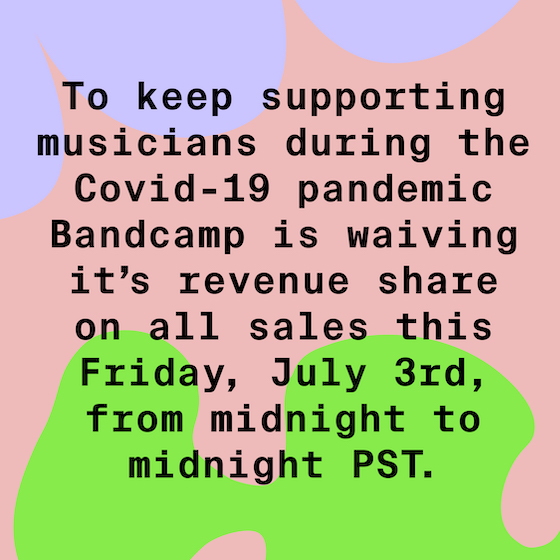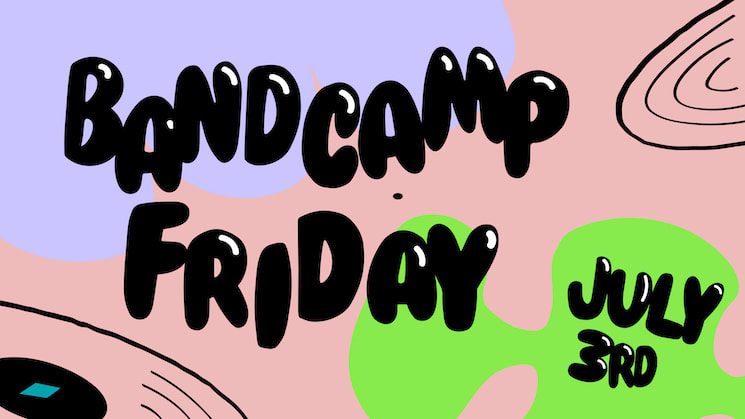When COVID-19 first hit, few could have predicted the impact it would have on independent artists, so many of whom rely on touring as a primary source of income. Fortunately, independent streaming service Bandcamp has stepped up to the plate by offering Bandcamp Fridays, a series of Fridays where they lift their fees and allow artists to keep 100% of the sales for their music.
Since the pandemic started, the company has offered up three editions of its fee-waving days. Further, on June 19, they celebrated Juneteenth by donating 100% of their fees to the NAACP Legal Defense Fund. They plan to make this an annual tradition.
This Friday (July 3), the company will offer up the next edition of Bandcamp Friday. (To help you keep track of the near-monthly holiday, they've launched IsItBandcampFriday.com, too.)
A company being celebrated for waiving its profits is almost unheard of, but in the precarious financial era that independent musicians face, it's a noble move by Bandcamp. As such, we caught up with the company's COO Josh Kim to find out where the idea came from and how it has affected Bandcamp as a whole.

Where did the initial idea to waive Bandcamp fees come from?
Musicians have been hit especially hard by the pandemic, with tours and shows canceled for the foreseeable future. Once we learned that such a major revenue stream for artists was basically gone, we knew that finding ways to support artists through the pandemic was an urgent priority.
We've always believe that the best way to support artists is to put money directly in their pockets, and Bandcamp was built from day one around that idea, so even before our first Bandcamp Friday on March 20, we were already seeing fans use Bandcamp to support musicians who had tours and shows canceled.
We came up with Bandcamp Fridays as a way to highlight that even more and engage as an entire community, and also encourage more fans to continue supporting artists until things are recovered.
It obviously got a lot of attention very quickly... does it feel weird to have people celebrating your brand not making money?
I think people are celebrating the fact that artists are making money, and as a company built around the mission of supporting artists, we're celebrating right alongside them. Our main measurement of success is the amount of money paid to artists, and that's way up overall since we started this initiative.
What have been the challenges of this initiative?
We all got a lot busier to support the increased activity to be sure, but in most ways, making the initiative happen was relatively straightforward: the service and the Bandcamp community have always been oriented around the idea of supporting artists, so Bandcamp Fridays have really been just an extension of what Bandcamp is about every day.
What has been the most rewarding part of it?
Seeing artists and labels share that they had their biggest sales day ever, and sharing that they were therefore able to pay for their mortgage, groceries and medications. It was seriously inspiring.
Many artists have communicated that they felt left behind in the age of streaming, which is a larger issue that this project points towards. What do you think needs to change for artists to be paid more fairly? Is it possible for other online music services to learn from Bandcamp?
On-demand streaming is like radio, in that it's convenient for fans but only works for a handful of the most mainstream artists, and generates spare change for most others. It also doesn't encourage a deep connection between the fan and the music, and ends up treating music like content and commodity.
But we don't think music is content. Music is art, and an indispensable part of our culture, and we should value it as such. A big part of that is compensating the people who make it fairly, and we'll continue working to make Bandcamp the best place for that to happen.
For Juneteenth, you did yet another project where you donated funds. What was that experience like? How much was donated and to whom? Do you plan to do similar projects to that as well?
The Juneteenth fundraiser will be happening every year on June 19, and our share of sales on that day every year will go to the NAACP Legal Defense Fund to support their work fighting for racial justice and equity. You can read more about it here.
The artist and fan community's support of the Black Lives Matter movement was inspiring to see, with many artists and labels ended up putting together special albums, tracks and merch specifically for Juneteenth (you can see a list of them here).
As another example, on the most recent Bandcamp Friday (June 5), we saw so many artists use the day to raise funds for racial justice organizations that we had to create two separate articles to list them all. See here and here.
Is it financially feasible for Bandcamp to keep doing these no-fee days?
Bandcamp has been profitable since 2012, and we focused on that early on to ensure that artists could rely on us for the long-term. For us to ask artists to make Bandcamp a central part of their own long-term, sustainable careers, we knew it was important that Bandcamp's business was itself long-term and sustainable.
Because of that focus on self-sustaining profitability, we're fortunate to be in a position to forgo a few days of sales a year.
Since the pandemic started, the company has offered up three editions of its fee-waving days. Further, on June 19, they celebrated Juneteenth by donating 100% of their fees to the NAACP Legal Defense Fund. They plan to make this an annual tradition.
This Friday (July 3), the company will offer up the next edition of Bandcamp Friday. (To help you keep track of the near-monthly holiday, they've launched IsItBandcampFriday.com, too.)
A company being celebrated for waiving its profits is almost unheard of, but in the precarious financial era that independent musicians face, it's a noble move by Bandcamp. As such, we caught up with the company's COO Josh Kim to find out where the idea came from and how it has affected Bandcamp as a whole.

Where did the initial idea to waive Bandcamp fees come from?
Musicians have been hit especially hard by the pandemic, with tours and shows canceled for the foreseeable future. Once we learned that such a major revenue stream for artists was basically gone, we knew that finding ways to support artists through the pandemic was an urgent priority.
We've always believe that the best way to support artists is to put money directly in their pockets, and Bandcamp was built from day one around that idea, so even before our first Bandcamp Friday on March 20, we were already seeing fans use Bandcamp to support musicians who had tours and shows canceled.
We came up with Bandcamp Fridays as a way to highlight that even more and engage as an entire community, and also encourage more fans to continue supporting artists until things are recovered.
It obviously got a lot of attention very quickly... does it feel weird to have people celebrating your brand not making money?
I think people are celebrating the fact that artists are making money, and as a company built around the mission of supporting artists, we're celebrating right alongside them. Our main measurement of success is the amount of money paid to artists, and that's way up overall since we started this initiative.
What have been the challenges of this initiative?
We all got a lot busier to support the increased activity to be sure, but in most ways, making the initiative happen was relatively straightforward: the service and the Bandcamp community have always been oriented around the idea of supporting artists, so Bandcamp Fridays have really been just an extension of what Bandcamp is about every day.
What has been the most rewarding part of it?
Seeing artists and labels share that they had their biggest sales day ever, and sharing that they were therefore able to pay for their mortgage, groceries and medications. It was seriously inspiring.
Many artists have communicated that they felt left behind in the age of streaming, which is a larger issue that this project points towards. What do you think needs to change for artists to be paid more fairly? Is it possible for other online music services to learn from Bandcamp?
On-demand streaming is like radio, in that it's convenient for fans but only works for a handful of the most mainstream artists, and generates spare change for most others. It also doesn't encourage a deep connection between the fan and the music, and ends up treating music like content and commodity.
But we don't think music is content. Music is art, and an indispensable part of our culture, and we should value it as such. A big part of that is compensating the people who make it fairly, and we'll continue working to make Bandcamp the best place for that to happen.
For Juneteenth, you did yet another project where you donated funds. What was that experience like? How much was donated and to whom? Do you plan to do similar projects to that as well?
The Juneteenth fundraiser will be happening every year on June 19, and our share of sales on that day every year will go to the NAACP Legal Defense Fund to support their work fighting for racial justice and equity. You can read more about it here.
The artist and fan community's support of the Black Lives Matter movement was inspiring to see, with many artists and labels ended up putting together special albums, tracks and merch specifically for Juneteenth (you can see a list of them here).
As another example, on the most recent Bandcamp Friday (June 5), we saw so many artists use the day to raise funds for racial justice organizations that we had to create two separate articles to list them all. See here and here.
Is it financially feasible for Bandcamp to keep doing these no-fee days?
Bandcamp has been profitable since 2012, and we focused on that early on to ensure that artists could rely on us for the long-term. For us to ask artists to make Bandcamp a central part of their own long-term, sustainable careers, we knew it was important that Bandcamp's business was itself long-term and sustainable.
Because of that focus on self-sustaining profitability, we're fortunate to be in a position to forgo a few days of sales a year.




